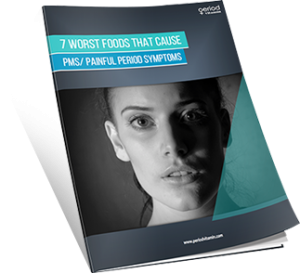Weight gain during PMS and/or your period is no picnic to deal with. Sometimes women can gain up to 10 pounds during their period. And if you’re a woman that this happens to, you full well know that you can’t wear your favorite skinny jeans or even favorite shoes when your weight has ballooned out.
If you’re suffering from weight gain during your period, you may already know that it’s the water retention that causes the bloating weight gain. You may have also been asking yourself how much weight can you possibly gain during each period – and may have even seen the scale climb up a little more each and every month.
And some women are in the worst possible situation – they’re trying to lose weight and for two weeks of the month, they end up gaining more than what they lost the previous weeks. It’s very discouraging, and they just give up. Not losing any weight during your period is frustrating and can easily evoke feelings that you’re a failure…
PMS Weight Loss That is Guaranteed
How to lose PMS water weight really isn’t that difficult if you have the knowledge you’ve been missing:
1. First consider your salt intake.
If you are eating too many salty foods, the salt will act as a magnet for water and hold it in your body especially during your period. Then you’ll wonder when does PMS weight gain go away because it won’t for quite a while. So stop eating salty foods during your period. Train yourself not to.
On the other hand, you can’t eat no salt because the result will be the same. You need a balance of sodium and potassium in the body, not no sodium or no potassium. Don’t feel bad if you add a pinch of salt to your meals; you can still stay away from extra sodium in foods such as canned soups, salty olives and chips.
2. Next consider your protein intake.
If you don’t consume enough protein in your diet, then what happens is that your cells end up swelling. With the swelling comes weight gain.
The antidote is simply calculating your protein needs for the day and then sticking to it. Take your body weight and divide by 2.2 to get the minimum amount of protein you need for the day. Then divide your body weight by 1.0 to get the maximum amount of protein you need for the day. Here’s an example: You weight 150 pounds. Divide 150 by 2.2 and you’ll get 68 grams protein as your minimum level. Your maximum would be 150 grams, usually an amount that most women would never eat. Sixty-eight grams is equal to about 10 ounces of protein per day; for example, a 4-ounce burger for lunch, 1 4-ounce salmon steak for dinner, and 2 eggs for breakfast.
3. Consider the status of your liver.
If your liver is not working optimally, you could end up with bloating and weight gain during any part of your monthly cycle. This is a common symptom of a dirty liver. The answer is to use liver cleanse herbal remedies for PMS weight gain. You’ll take 1-2 capsules of the liver cleanse twice daily for about 45 days.
4. What about your water intake?
During PMS, it’s common for women to mistakenly believe that because their weight is increasing, then they should stay away from drinking extra water. This is not true at all. Those who are trying to lose weight and don’t drink their water will never lose the weight – the process of fat breakdown is dependent on one thing: water.
How much should you drink? Take your body weight and divide it by 2. This is a minimum in ounces of how much you should drink daily.
5. Are you getting enough vitamins and minerals?
Do you take a Period Vitamin daily? If not, it will fill in the nutritional gaps in your diet. It’s created specifically for women’s needs during their cycles – yet is taken daily.
6. Are you eating enough vegetables?
Vegetables are mysterious in that they will fill in numerous biochemical gaps that result from an imperfect diet. The foods to eat for PMS weight gain are clearly vegetables (and protein foods).
These dieting tips for PMS weight gain are actually pretty easy to follow. Just dive in and go for it!


